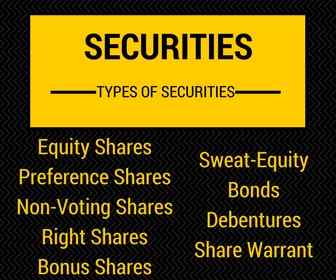Securities refer to an investment that can be freely traded in the market and provides a right or claim on an asset and all future cash flows generated by that asset.
According to Securities Contracts Regulation Act, 1956, “securities include shares, scrips, stocks, bonds, debentures, debenture stock or other marketable securities of a like nature in or of any incorporated company or other body corporate.”
Classification of Securities
Securities can be divided into Corporate Securities and Government Securities on the basis of source of issue.
According to Securities Contracts Regulation Act 1956, a Government Security refers to a “security created and issued, whether before or after the commencement of this Act, by the Central Government or State Government for the purpose of raising public loans and having one of the forms specified in clause (2) of section 2 of the Public Debt Act, 1944.” While a corporate security refers to a security which is created and issued by an incorporated company or a body corporate.
On the basis of return, securities can be divided into Fixed Income and Variable Income Securities.
Types of Securities

• Equity Shares – A company`s share capital is divided into a number of equal and indivisible units of fixed amount, each of which is called a share. Shares which do not carry any preferential rights in repayment of capital (payment of principal amount) and dividend payments (payment of interest) are equity shares. The rate of dividend is not fixed and varies depending upon the profitability, financial position and business objectives of a company. The owners of equity shares are the owners of the company and have voting rights in the management of the company.
• Preference Shares – Shares which carry preferential rights in respect of dividend payment and repayment of capital are preference shares. These shares carry a fixed rate of divided and preference over equity shareholders in dividend payment and payment of capital at the time of liquidation of the company. They generally do not carry any voting rights.
• Non-voting Shares – These shares are entitled to the same stream of benefits as equity shares but carry higher dividends as they do not have any voting rights. On non-payment of dividend for 2 years these are automatically converted into voting shares.
• Right shares – These shares are offered as additional shares after the original issue to the existing shareholders of the company. Existing shareholders can subscribe to these in proportion of their existing holdings. These are issued to finance fund requirements of the company in times of need. They are usually offered at a discount. These can be issued only after two years of the formation of the company or one year after the first share allotment, whichever is earlier.
• Sweat Equity Shares – These are equity shares that are issued by a company to its board of directors and/or employees at a discount or for consideration other than cash, for providing managerial or technical know how or for providing/making available some intellectual property rights or value additions; to the company. They form a part of the existing equity share capital of the company.
• Bonus Shares – Bonus shares are issued for free to existing shareholders of the company by converting the reserves/profits of the company into share capital. It involves capitalization of the reserves of the company. These are issued for providing capital gains to shareholders out of company profits, when the business is in a profitable position.
• Bonds & Debentures – These are long term debt instruments consisting of a promise by the issuer to pay a stipulated stream of cash flows in the future to the person holding the security. E.g. Govt. Securities, Savings Bond, PSU bonds, debentures of Private companies. They are used to raise medium and long term capital funds from the public. Such a security comprises of periodic interest payments over the life of the instrument and principle payment at time of its redemption.
• Share Warrant – It is a document issued by a public company that provides the right to the bearer/holder of the document to buy a specified number of shares at a specified time. The bearer does not enjoy the same benefits as equity share holders. Share Warrants can be freely traded in the market but require a prior approval of the central government before it is issued.